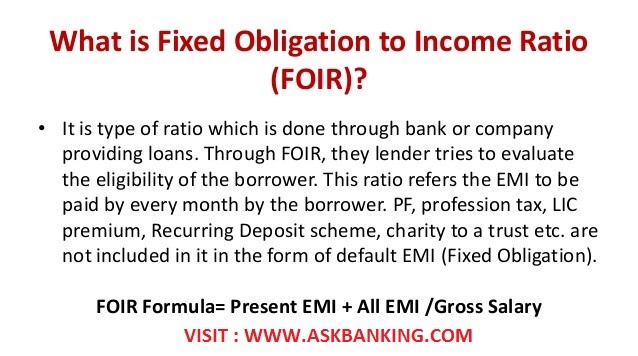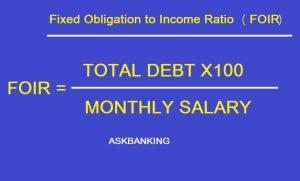Fixed Obligation to Income Ratio formula is an important parameter in Loan calculation while maintaining Rating Chart. FOIR ratio includes all the fixed obligations that the customer is supposed to pay regularly on a monthly basis. The Fixed Obligations however, do not include statutory deductions from the salary like Provident Fund, Professional Tax and deductions for investment like Voluntary Provident Fund, Insurance Premiums, Recurring deposits etc.
FOIR Ratio Calculator :
In FOIR calculation, the Bank takes into account the installments of all other loans previously availed of by the customer, including the home loan applied for.
For example:
Income -Rs 50,000 p.m.
Car loan installment: Rs 8,000 pm
Fridge loan installment: Rs 2,000 pm
Proposed housing loan installment: Rs 15,000 pm
FOIR = [sum addition of all installment i.e. Car, Fridge, Housing /50000 or 50 % or 0.05 i.e. Rs 25,000.]
Bank’s have different standard for FOIR. The loan amount and rate of Interest are greatly vary based on FOIR rating of borrower.
How does the fixed obligation to income ratio affect your loan eligibility?
A lower FOIR strengthen the repayment capacity of the borrower to repay the loan easily.
- Less liabilities
- Higher Income
- Higher repayment capacity
- Loan approval chances are much better
What should I do if my Fixed Obligation to Income Ratio is high?
In general bank doesn’t finance or give loan if FOIR eligibility criteria doesn’t meet. Bank always ask for co-borrower or co-applicant with income.
Why to calculate FOIR ?
While calculating the FOIR, the banks are considering the applicant’s income and the outstanding instalments of all loans including the Equated Monthly Instalment (EMI) of the prospective loan which is under consideration.
FOIR vary from bank to bank and from case to case, but on average, it should be between 40% to 60% depends on the various categories of loans.

